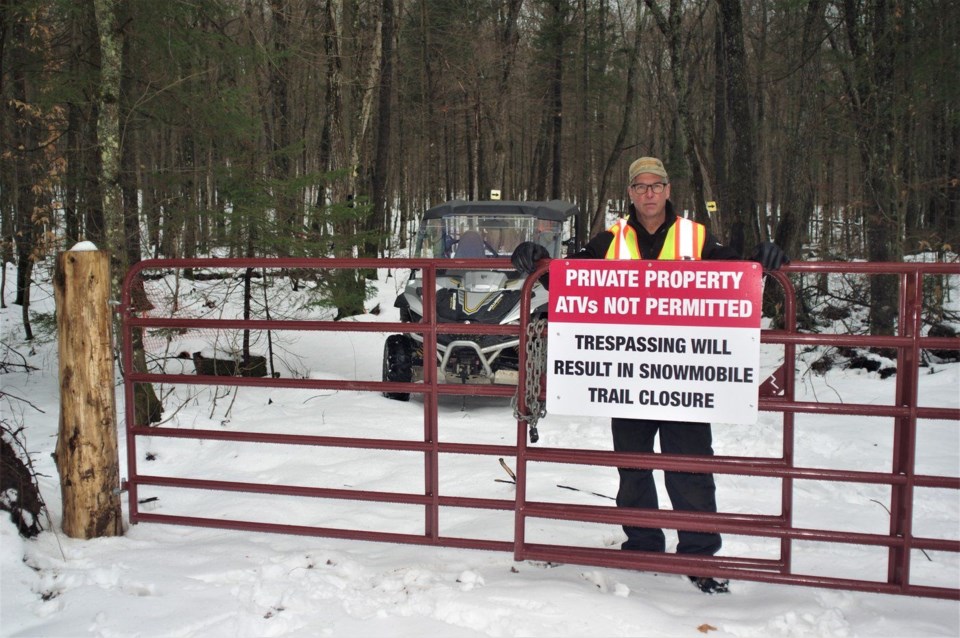Snowmobile riders who use established trails in the South River area came close to losing access to one of those trails thanks to ATVers travelling over private land without permission, despite no trespass and private property signs.
Jeff Griffith, president of the Near North Snow Drifters, said the potential loss of use of that key trail took place in September when ATV riders "tore a gate off the hinges, drove over the gate and on the trail” which was private land.
The people who destroyed the gate have never been identified.
The landowner in question has an agreement with the local snowmobile club that allows members with valid permits to ride over his land during snowmobile season.
The landowner, who did not want to be identified, was so angry with his property being destroyed that he called Griffith telling him he was revoking the club's access to his land.
Griffith said it's not the first time the same landowner has run into problems with ATVers on his property.
In a separate recent incident, the same landowner confronted ATVers on his land and when he told them they were trespassing “they became aggressive toward him and argumentative.”
Griffith said no landowner has to endure this kind of behaviour and understands why they become frustrated over a land use issue, especially when they are trying to provide recreational activities to people.
He said fortunately in the September incident he was able to meet with the landowner a short time later, and a solution arrived that keeps the trail open to snowmobilers.
Where the damaged gate once stood there are now two thick posts buried five feet in the ground and two steel gates hinged to the posts that also overlap by three feet.
Griffith said the local club also created ditches on both sides of the trail, cut several trees, and covered them with sand and earth “to create a natural barrier.”
Other trees in the immediate area have also fallen down naturally over time and they have been left in place to make sure ATVers can't easily access the land.
“The goal was to make it as difficult as possible to trespass,” Griffith said.
“They'll have to go to great lengths to trespass at this site.”
The gate is locked and in the middle is a sign that clearly states ATVers are not allowed on the private property and ATV riders ignoring the sign will result in the complete closure of the snowmobile trail.
Griffith said the club came up with the wording and the landowner agreed with it and signed a one-year agreement with the Near North Snow Drifters.
“So that sign clearly states the consequences for everyone,” Griffith said, including snowmobilers.
Griffith said landowners don't want ATVers on their property because the vehicles destroy the land.
Then there's also the liability issue they face if someone gets hurt on their land even though the rider wasn't supposed to be there.
Griffith said ATVers trespassing isn't a new issue facing snowmobile clubs and it's one that goes on throughout Ontario.
Just yesterday, a memorandum of agreement between snowmobile and ATV governing bodies was signed to strengthen efforts to combat off‐trail riding, trespassing, and seasonal trail usage
See: Sledders and ATVers join forces in Ontario
And: Noisy sledders may lose key local trail
But Griffith warns the growing issue is “starting to threaten the livelihood of our trails.”
As an example, Griffith says the Near North Snow Drifters club usually sets its budget for the season by September.
The budget contains enough money to pursue projects earmarked for that current season.
However, the gated trespass incident cost the club one-third of this year's budget.
“This was an unexpected matter,” Griffith said.
“It's impacted our budget because we had to allocate some money to an unexpected expense and some projects we had planned for this year now have to fall off the list.”
Griffith said that had the landowner stuck to his guns and closed snowmobile access to his land, it would have been even worse for the club.
He said closing access to the trail would have forced the club to re-route the trail onto other lands.
This is a process that takes six to 12 months because extensive planning is involved, permission is needed from a different landowner and then agreements are drawn up and signed.
Once this is done the club next faces a huge bill from the contractor who is hired to blaze a new trail.
Alternatively, snowmobilers could be forced onto roadways in instances where a new trail is not possible, or the trail could completely close.
Griffith adds no one would like these latter alternatives.
He says snowmobile clubs try to develop trails on Crown Land as much as possible but when they can't that's where the agreements with private landowners come in.
He says this is why it's so critical that recreational riders respect signs.
Griffith emphasized this also goes for snowmobilers who need to stay on the established trails.
“A big reason why landowners don't want snowmobilers going off the trails is sometimes doing that takes them over a farmer's field,” Griffith said.
Griffith said going over those fields damages the farmer's cropland which in turn affects their livelihood.
Griffith said it's a very small number of recreational users that have put snowmobile riding over private land at risk for the majority. But he says that's all it takes.
Rocco Frangione is a Local Journalism Initiative reporter who works out of the North Bay Nugget. The Local Journalism Initiative is funded by the Government of Canada.



